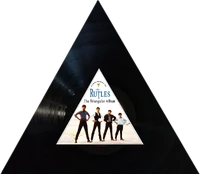OttselSpy25 (talk | contribs) |
OttselSpy25 (talk | contribs) |
||
| Line 95: | Line 95: | ||
*[[Rutallica]]'s ''[[The Rectangular Album]]'', a spoof the album |
*[[Rutallica]]'s ''[[The Rectangular Album]]'', a spoof the album |
||
*[[Lunch]], which sampled "We've Arrived! (And to Prove It We're Here)" and "Unfinished Words" |
*[[Lunch]], which sampled "We've Arrived! (And to Prove It We're Here)" and "Unfinished Words" |
||
| + | |||
| + | == Footnotes == |
||
| + | <references/> |
||
[[Category:Studio Albums]] |
[[Category:Studio Albums]] |
||
Revision as of 14:51, 5 October 2020
| The Triangular Album | |
|---|---|
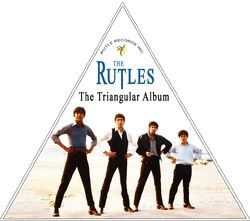 | |
|
Released |
22 November 1968 |
|
Recorded |
30 May – 14 October 1968 EMI and Trident Studios, London |
|
Genre |
Rock |
|
Length |
1:26:00 |
|
Label |
|
|
Record |
|
|
Preceded By |
Tragical History Tour (1967) |
|
Succeeded By |
Yellow Submarine Sandwich (1969) |
The Triangular Album is a 1968 album released by The Rutles, and the first released under the Rutle Corps label (although the company is listed on the sleeve as "Banana Records.")
More notably, The Triangular Record goes down in record's records as the only record to be produced in a triangular shape, hence its title. This was considered shocking and innovative to the general public, and was labeled by critics as "literally transformative," although in some early editions this did lead to technical glitches.
Most of the music featured on The Triangular Album was written (and in some cases recorded) during the band's visit to India, where they took part in a Ouija board course with Arthur Sultan. While other guests were quite cynical about the "board tapping," the quartet found it spiritually transcendental. Literally, it was their connections with spirits that defined the album's direction.
Exiled from their high-production, expensive equipment (and their tea) The Triangular Album proved to be a much more thoughtful, laid-back, and well-hydrated album when compared to the triumphant Sgt. Rutter's. Nowhere is this more apparent than in "Unfinished Words", Nasty's tribute to the art of songwriting itself.
It is additionally propositioned by some in the band that it was the shape of the Ouija "Planchette" which inspired the shape of the album. This is brought into question by the early designs of the album, which contained many-sided objects, but the connection is worth noting.
The album was generally liked by audiences and critics, although some criticized the topical tunes for failing to find any agenda. Stanley J. Krammerhead III, Jr wrote of the album:
- “Sparsley unwonted for this gentile ensemble, the strains executed have a sparticulous and irrefragable agitational idiosyncrosis which will incontestably percolate into the formulae of pedestrian tablature. Yet their hermeneutical impotence speculates a bifurcation from the veridical existence. In brief, one covets a postulatorial tribulation as whetted and acuminated as the long-play's periphery.”
- ―Stanley J. Krammerhead III, Jr
Background
In the late-60s, there was a large feeling of innovation. This is often considered the peak of their innovations. The group released this album, along with its many strange tracks, to a large audience.
Design
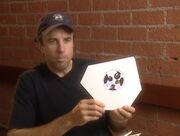
One of the original designs.
Kevin Wongle was a record designer in London, and had designed the album's strange exterior. He took the infamous photos of the prefab four and found them amazing to be around.
Originally, it was not planned to have the record be triangular. The earliest known prototype was in fact an octagon. The image in the center of the record was originally one taken from a toilet bowel that the four looked down at.
Another appeared to be a misshaped polygon, with the same image in the center. This version actually would be on the market for at least three months, but it had to be redesigned due to a large number of complaints of missing parts of music. One other design was that of a rhombus, whilst another looked that of a trapezoid. The next-to-last version of the album was a triangle but had an elongated tip, which led to multiple stabbing incidents. Finally, the album was made in its correct triangular shape in time for October 1968.
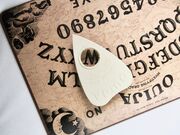
Stig O'Hara later admitted that the similarity to a Ouija planchette was a core reason he preferred the final design.
Some note that the shape of the album is very similar to a Ouija planchette, notable as the band had been spending time with Ouija-specialist Arthur Sultan at the time of writing most of the album. Stig O'Hara noted years later that it was indeed something he took note of when shown the final design.
There was also brief consideration made to make the cover all-one-color with simply the words "The Rutles" written across. This was used for the 50th Anniversary re-release.
Reception
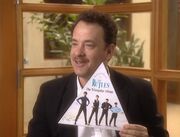
Tom Hanks, Rutles fan, analyzes The Triangular Album.
When the album came out, it was an immense success. Many fans, including celebrity Tom Hanks, said that they "couldn't get enough of them." Fans also were shocked of the album's shape, because "most records were round." Many fans have reported rarely ever listening to it, because they "just watched it going around the record."
However, there was some backlash amongst certain fans, especially those who were annoyed at the technical issues present due to the album's shape. Many fans took to calling the record 'The Shite Album,' included Salman Rushdie, who stated in an interview with Melvin Hall in 2002:
- “"I remember going to the record store and buying this thing... It was selling so fast that they were selling it from the cardboard boxes, they weren't even unpacking it. It was an amazing phenomenon. And I went back thinking, after having been such a great admirer of Sgt. Rutter, you know, "can this possibly be anygood, you know, will it be a true successor?" And of course, it was shite."”
- ―Salman Rushdie[1]
To this day, no one has ever attempted to make another Triangular Album, because the Rutles had done it, less that they had done it well, but simply because they had done it.
Tracklist
Side one

The alternate album cover, considered by the band at the time, which was used for the 50th Anniversary Edition.
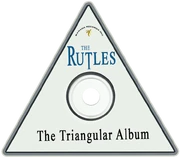
The Compact Disc version of the album.
- We've Arrived! (And to Prove It We're Here)
- Dear Pruneance
- Unfinished Words
- Blah Bluh Bleh, Blih Blyh Bloh
- Wild Bunny Rum Cake
- Fallen Archangel
- While My Piano Gently Screams
- Sadness Is A Cold Phaser Gun
Side two
- Bertha My Reindeer
- I'm So Awake
- Whackbird
- Pugs
- Apollo Squirrel
- Why Don't We Get Naked and Have A Special Hug In The Middle Of New York?
- I Quill
- Jolliet
Side three
- Death Day
- Theyr Reds
- Barry's Mature Mum
- Everybody's Got Something To Show Except Me And My Chimpanzee
- Celibate Sadie
- Pelter Yelter
- Bong, Bong, Bong
Side four
- Evolution 1
- My Little Ukulele
- Shuffle Truffle
- Wry, Baby, Wry
- Evolution Number Ten
- Good Afternoon
See Also
- The Rutles (album)
- Rutallica's The Rectangular Album, a spoof the album
- Lunch, which sampled "We've Arrived! (And to Prove It We're Here)" and "Unfinished Words"
Footnotes
- ↑ An extended interview from the DVD of The Rutles 2: Can't Buy Me Lunch. Curiously, Rushdie also claims the album "had no title," despite this not being the case.
